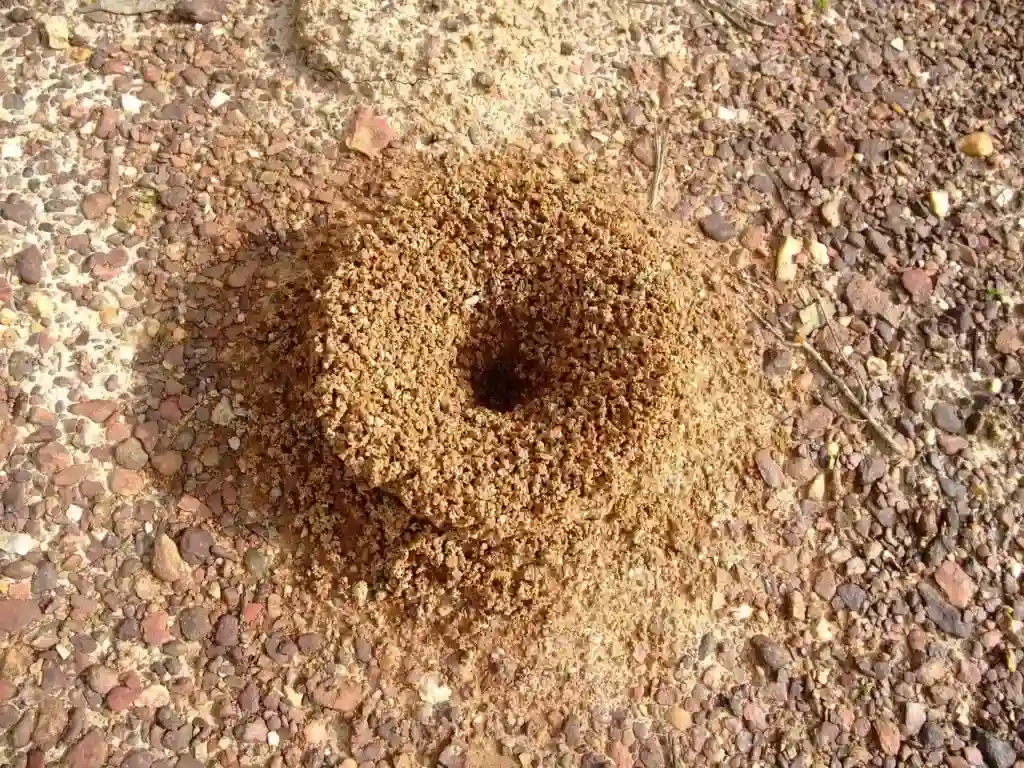Ants can be pesky little creatures that are not only annoying but can also wreak havoc on your lawn. This is why many people look for ways to get rid of ants and prevent ants from revisiting their property.
While you may want to kill all the ants you see around your home, you also want to learn how to prevent ants from making another appearance.

In this article, aside from how to kill ants in your yard, you’ll learn:
- Natural ways of repelling ants
- How to deter ants in your home
- Lawn care practices to control ants
- How to monitor ants on your property
- When to consider chemical pesticides
We’ll also tell you how maintaining your lawn with lawn care services from FortSmith Landscaping can help to keep your yard ant-free.
Importance of Maintaining an Ant-Free Yard
You want to stop ants from making a home in your yard because ant hills can smother and kill your grass. If an ant nest or any colony because too extensive, the tunnels the ants have built will cause the soil to become too dry, resulting in dead grass.
Depending on the type of ants that are in your yard, you may be dealing with critters that bite and sting. This is another reason why you would want to get rid of an ant infestation or ant nests in your yard. It’s important to determine the types of ants that are causing problems so that you know just what you’re dealing with.
Understanding Ant Behavior
When you discover you have an ant problem in your art, it’s important to have a little insight into their behavior. Ants don’t act alone. They live in colonies that may amount to as many as a few million members. This is why many people want to get rid of an ant infestation as soon as they discover it.
Ants work together to gather food and care for their young. Each type of ant has a job from the queen to the worker ants, they all know what needs to be done and are methodical in their activities.
Prevention: How to Repel Ants from Your Yard
You don’t have to wait until you find ant mounds or have large-scale ant problems to take action to protect your yard. There are several things you can do to repel ants from your yard right now.
Using Aromatic Herbs And Plants
There are certain smells that ants can’t tolerate. This is why many people turn to aromatic herbs and plants as a way to repel ants. Some of these include:
- Thyme
- Lavender
- Rosemary
- Mint
- Basil
Add any of these to your yard or essential oils and notice how few ants you have.
Creating Barriers With Cinnamon Or Coffee Grounds
Cinnamon and coffee may taste great to us, but they are not a favorite of ants. If you want to keep ants away, add a few drops of cinnamon oil and water together and spray it around. But be careful because it is known to kill grass and other plants. You can also put cinnamon sticks near windowsills to discourage ants from getting inside your home.
The next time you make a pot of coffee, don’t throw the grounds away. Use them as an ant repellant. Try sprinkling coffee grounds along the edge of a flower or raised garden bed to create a barrier that ants won’t cross.
Lawn Care Practices to Control Ants
If you’re looking to control the number of ants inside your yard, some lawn care practices can help in the process.
Mowing And Trimming Techniques To Reduce Ant Habitats
Ants are more likely to infest a lawn that is bare or patchy rather than one that is thick and healthy. Mow your grass to the right height and water it the appropriate amount to keep it healthy. Maintaining the right fertilizer schedule for your grass type can also reduce ant nests and ant mounds. You can help cut down on ants in the summer by performing proper spring preparation.
Proper Irrigation And Drainage To Discourage Ant Nesting
Ants don’t like water, so regularly watering your grass or garden soil is one way to discourage them from nesting. You don’t want to overwater the area and risk running any of your crops or grass. Some people choose to install a timed sprinkler system to keep the area watered appropriately.
Non-Toxic Ant Control Methods
There are several non-toxic ways to control ants and protect your yard. Check out some of the options:
Homemade Ant Baits And Traps
If you want to drive ants away rather than kill them, make a repellant spray with orange peels and white vinegar. Mix equal parts of water and vinegar in a pot and drop in 2-3 orange peels. Bring the mixture to a boil, then turn the heat off. Allow the orange peels to steep in the water overnight before transferring the mixture to a spray bottle. Shake the bottle to mix and then spray wherever you want to keep ants away.
Using the juice of a lemon at the entry spot and leaving the peel there is another way to repel ants without using harsh chemicals. Peppermint oil and chili powder are also options to consider.
Some people pour boiling water on an ant trail and down an anthill to try to kill the worker ants and queen ant right away. But those that survive can create a new colony and build another nest.
You can also try to sprinkle baby powder around the nest and along the trails to keep ants away. Ants don’t usually like the scent of baby powder. You can either spread it around the nests or use a funnel to slowly pour it directly inside the nests at the entry points.
Diatomaceous Earth: A Natural Ant Killer
Some people turn to diatomaceous earth to get rid of ants. Diatomaceous earth is made of tiny fossils that microscopic organisms called diatoms leave behind. While they are too small to hurt humans, they are deadly to ants.
Spread diatomaceous earth wherever you see the ants. This includes all over the nests. It will eventually dehydrate the ants and kill them off. This can take some time, so don’t get discouraged if you don’t see results right away. You can find it in either industrial-grade or food-grade versions. Diatomaceous earth also contains different nutrients that can help your lawn and keep your grass healthy.
Chemical Ant Control Options
When To Consider Chemical Treatments
If home remedies are not working, you may want to consider chemical treatment options. Chemical pesticides can come in different forms including dust, spray, liquid, and ant bait traps.
Chemical treatments are effective because they typically kill the entire colony without harming the lawn. Be sure to check the type of pesticide you choose because some can damage the lawn and shouldn’t be used around edible plants. Pesticides are not a good idea in areas where children and animals are near unless you are battling invasive lawn pests and can keep the area clear for a while.
Selecting Ant-Specific Insecticides
If you decide to use chemical pesticides, be sure to choose one that is specifically for ants. This will give you a better chance of success in treating them. Read all labels and application methods so that you are using the product correctly to get rid of ant colonies.
Applying Ant-Control Treatments
Treating The Ant Trails And Nests
Sprays and dust work by killing ants on the spot as they ingest the chemicals. No matter what type of chemical you choose, you have to kill the queen ant if you want to totally eliminate the ant colony and ant trails in your yard.
You can also try ant bait traps. These trick the ant into believing that the bait is the food source. When they think they are going for the food, they get trapped.
Safety Precautions And Protective Measures
When you are applying any type of chemical treatment, be sure to always read the instructions. Never apply them near children and pets. Many chemical pesticide labels recommend keeping children and pets away for a duration after an application.
During an application, wear gloves, long pants, and long sleeves. This will help to protect yourself. Some people also choose to wear protective eyewear. After applying a chemical pesticide, be sure to change and wash your clothes.
Monitoring and Maintenance
Regular Inspections For New Ant Activity
Once you successfully get rid of the ants living on your property, you want to regularly inspect the area for new ant activity. You may want to hire a professional to make sure you are not missing anything.
Additional Preventive Measures To Sustain An Ant-Free Yard
There are several other precautions you can take to keep ants away from your yard.
- Store wood off the ground and away from your house. Carpenter ants like to make their nests around wood. Be sure to keep any lumber far away from your foundation to prevent ants from getting into your yard.
- Fix water leaks and holes. Leaks can attract ants while holes allow them inside. Fill any holes around your foundation with caulk. Apply an epoxy putty to seal leaking pipes.
- Trim trees that touch your house. Long tree branches make it easy for ants to get into your home. Trim any branches that extend towards your home as well.
FAQs about Killing Ants in Your Yard
Can Ants Cause Damage To Lawns?
Yes! Ants destroy the grass’s root structure leading to brown spots. Ant nests can also make your lawn uneven and difficult to mow.
How Long Does It Take To Eliminate an Ant Nest?
This depends on the treatment method. Typically, it can take two weeks or longer to fully eliminate an ant nest.
Are There Any Eco-Friendly Ant Control Methods?
There are several eco-friendly ant control methods. Cinnamon oil, coffee grounds, baking soda or baking powder are all eco-friendly options.
Achieve an Ant Free Yard and Schedule a Complementary Lawn Review With FortSmith’s Lawn Care Experts
Trust FortSmith Landscaping with all of your lawn care needs. Our experts know what it takes to achieve the lush green lawn that will be the envy of the neighborhood. Call us today at (919) 228-8495 to learn more!
